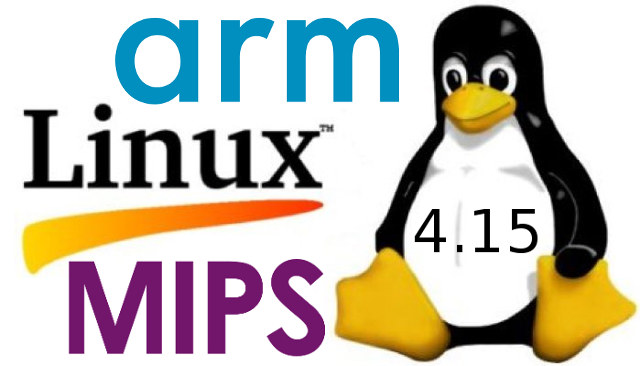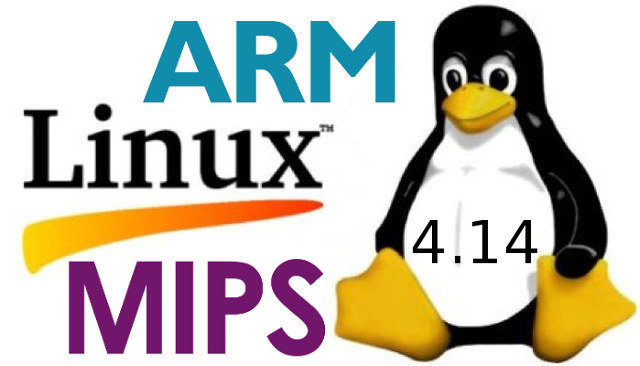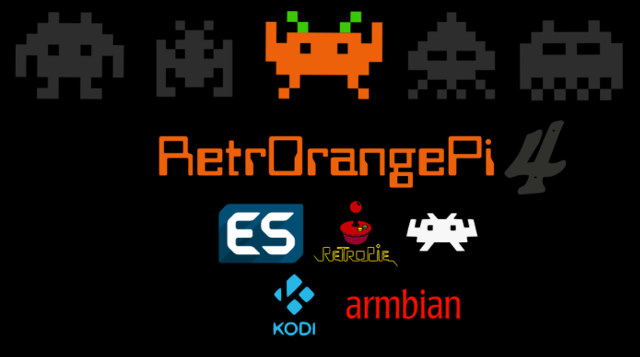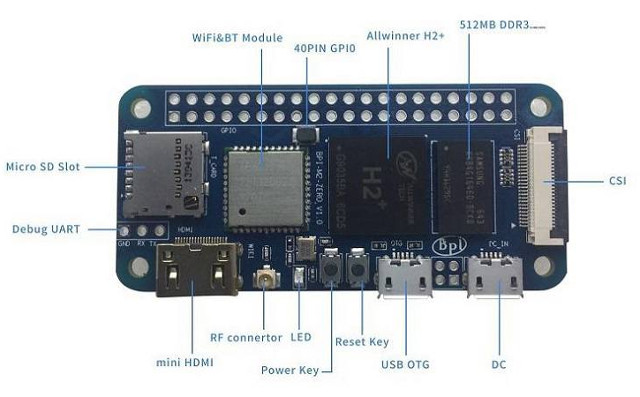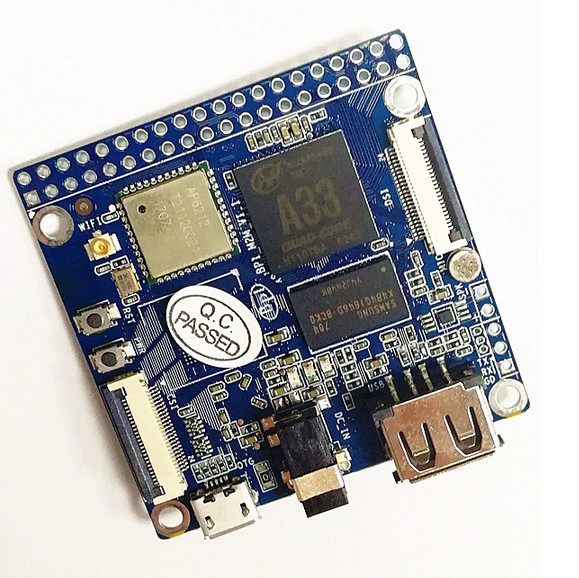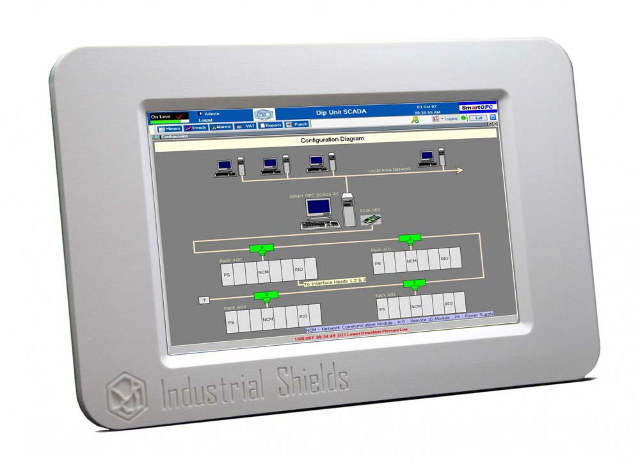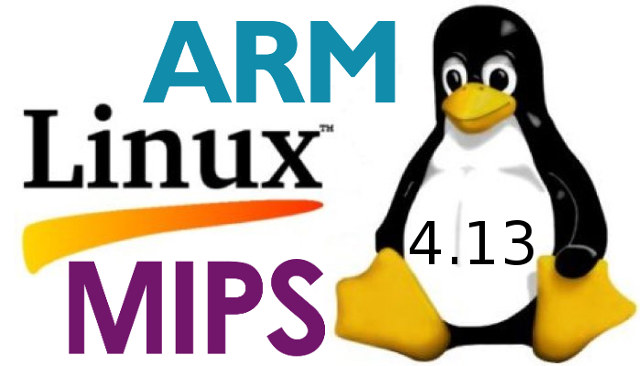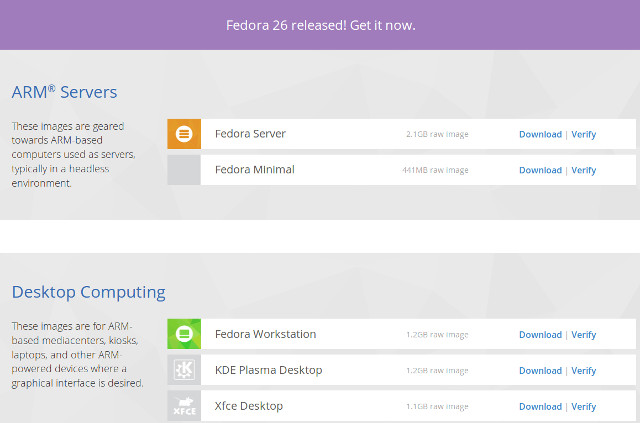Linus Torvald has released Linux 4.15 last Sunday: After a release cycle that was unusual in so many (bad) ways, this last week was really pleasant. Quiet and small, and no last-minute panics, just small fixes for various issues. I never got a feeling that I’d need to extend things by yet another week, and 4.15 looks fine to me. Half the changes in the last week were misc driver stuff (gpu, input, networking) with the other half being a mix of networking, core kernel and arch updates (mainly x86). But all of it is tiny. So at least we had one good week. This obviously was not a pleasant release cycle, with the whole meltdown/spectre thing coming in in the middle of the cycle and not really gelling with our normal release cycle. The extra two weeks were obviously mainly due to that whole timing issue. Also, it is […]
Linux 4.14 Release – Main Changes, ARM & MIPS Architecture
Linus Torvalds has announced the release of Linux 4.14: No surprises this week, although it is probably worth pointing out how the 0day robot has been getting even better (it was very useful before, but Fengguang has been working on making it even better, and reporting the problems it has found). Sure, some of the new reports turned out to be just 0day doing things that just don’t work (ie KASAN with old gcc versions, but also doing things like loading old ISA drivers in situations that just don’t make sense – remember when you couldn’t even ask if the hardware existed or not, and just had to know), but even then it’s been all good. The appended shortlog is obviously only for the (small) haul since rc8, and it really is tiny. Not very many commits, and they are small. The biggest thing that stands out in the diffstat […]
RetrOrangePi 4.0 Released
RetrOrangePi is a retro gaming & media center firmware based on Armbian Debian image and working on Allwinner H3/H2+ based Orange Pi boards, Banana Pi M2+, and NanoPi M1, as well as Beelink X2 TV Box. Right at the end of last year, I reviewed RetrOrangePi 3.0 on Orange Pi One board to which I connected Mars G01 gamepad, and I could play some games like Wolfenstein 3D and Quake, and watch videos on OpenELEC/Kodi 16. The firmware also comes with various emulators, but you’d have to load the ROMs yourself due to intellectual property / license issues. The developers have now released RetrOrangePi 4.0. RetrOrangePi 4.0 changelog: Latest Armbian v5.32 (Debian Jessie kernel 3.4.113) RetroPie-Setup v4.3.3 (unofficial fork, upgradeable) New RetrOrangePi repository for easy updates and fixes EmulationStation v2.6.5 with video and game collection support, Desktop/OpenELEC shorcuts from main menu New ROPi “Attract-Mode”-like theme (based on Cosmos theme) Retroarch […]
$15 Banana Pi M2 Zero Board is a Raspberry Pi Zero W Clone with a Quad Core Processor
Many development boards have followed Raspberry Pi 2/3 form factor in recent years, including Hardkernel ODROID-C2 and Pine64 ROCK64, but so far I had not seen any boards leveraging Raspberry Pi Zero (W) form factor. SinoVoIP will change that, as they’ve just launched Banana Pi M2 Zero (aka BPI-Zero) board powered by Allwinner H2+ quad core processor, leveraging Raspberry Pi Zero W form factor, and now selling on Aliexpress for $15 plus shipping. Banana Pi M2 Zero specifications: SoC – Allwinner H2+ quad core Cortex A7 processor @ up to 1 GHz with Mali 400MP2 System Memory – 512 MB DDR3 Storage – micro SD card slot up to 64GB Video/Audio Output – mini HDMI Connectivity – 802.11 b/g/n WiFi and Bluetooth LE (AP6212 module with options for AP6181, AP6335) Camera – 1x MIPI CSI connector supporting 8-bit YUV422 CMOS sensor, CCIR656 protocol for NTSC and PAL, 5MP camera, 1080p […]
Banana Pi M2 Magic Board Now Sold with Allwinner A33 Processor for $23
Banana Pi M2 Magic development board was first unveiled in February of this year with an Allwinner R16 SoC, 512 MB RAM, and 8GB eMMC flash, and its main selling points were support for MIPI DSI LCD displays, CSI cameras, and 3.7V LiPo batteries. AFAIK SinoVoIP never sold that version of the board, at least on Aliexpress. Possibly due to the intricacies of Allwinner business units, the company has now officially launched Banana Pi M2 Magic (aka BPI M2M), but replaced Allwinner R16 by the similar Allwinner A33 processor, and removed the 8GB eMMC flash to bring the price down to $23 plus shipping. The “old” Allwinner R16 based Banana Pi M2 Magic board will apparently be sold as M2 Magic Plus soon. Banana Pi BPI-M2 Magic (A33) specifications: SoC – Allwinner A33 quad core ARM Cortex-A7 processor with ARM Mali 400 MP2 GPU System Memory – 512MB DDR3 Storage […]
Industrial Shields Industrial Panel PCs are Based on Raspberry Pi, Banana Pi, or HummingBoard
Boot&Work Corp., S.L. is a company based in Catalonia that sells industrial automation electronic devices under “Industrial Shields” brand. What makes their product noticeable is that they all appear to be based on maker boards such as Arduino or Raspberry Pi. The company offers various Arduino based PLC modules with or without Ethernet that can be controlled with 10.1″ industrial grade panel PCs based on ARM Linux development boards. Currently three sub-families are available: HummTOUCH powered by Solidrun HummingBoard-i2 NXP i.MX 6Dual Lite board BANANATOUCH with either Banana Pi M64 (Allwinner A64 quad core Cortex A53) or Banana Pi M3 (Allwinner A83T octa core Cortex A7) TOUCHBERRY with Raspberry Pi model B or Raspberry Pi 3 model B Beside the different processors, the 10.1″ Panel PCs share some of the same specifications: Display – 10.1″ resistive multitouch LVDS, 315 nits, 170° viewing angle, 1280×720 resolution Video Input – MIPI CSI […]
Linux 4.13 Release – Main Changes, ARM & MIPS Architectures
Linus Torvalds has just announced the release of Linux 4.13 and a kidney stone…: So last week was actually somewhat eventful, but not enough to push me to delay 4.13. Most of the changes since rc7 are actually networking fixes, the bulk of them to various drivers. With apologies to the authors of said patches, they don’t look all that interesting (which is definitely exactly what you want just before a release). Details in the appended shortlog. Note that the shortlog below is obviously only since rc7 – the _full_4.13 log is much too big to post and nobody sane would read it. So if you’re interested in all the rest of it, get the git tree and limit the logs to the files you are interested in if you crave details. No, the excitement was largely in the mmu notification layer, where we had a fairly last-minute regression and […]
Fedora 26 Supports Single “Unified” OS Images for Multiple ARM Platforms
The decision to use device tree in Linux occurred several years ago, after Linus Torvalds complained that Linux on ARM was a mess, with the ultimate goal of providing a unified ARM kernel for all hardware. Most machine specific board files in arch/arm/mach-xxx/ are now gone from the Linux kernel, being replaced by device tree files, and in many case you simply need to replace the DTB (Device Tree Binary) file from an operating system to run on different hardware platforms. However, this is not always that easy as U-boot still often differ between boards / devices, so it’s quite frequent to distribute different firmware / OS images per board. Fedora has taken another approach, as the developers are instead distributing a single Fedora 26 OS ARMv7 image, together with an installation script. Images for 64-bit ARM (Aarch64) are a little different since they are designed for SBSA compliant servers, so […]


